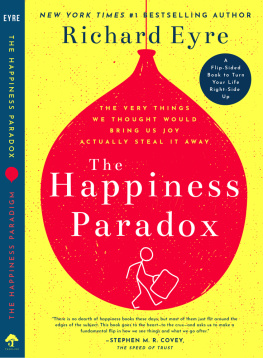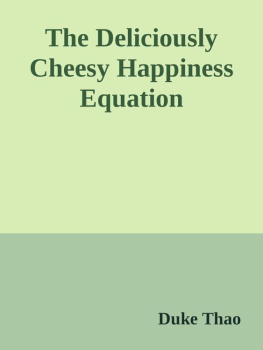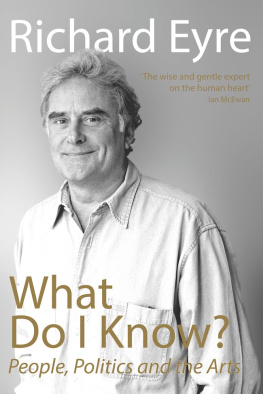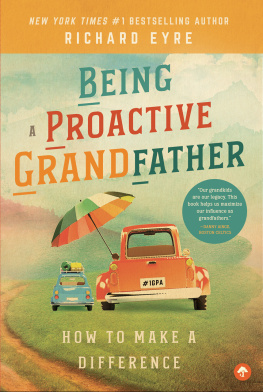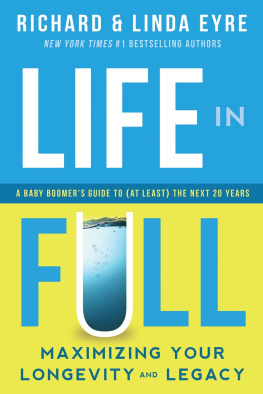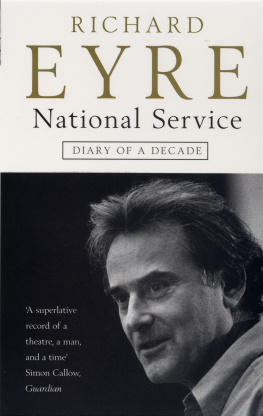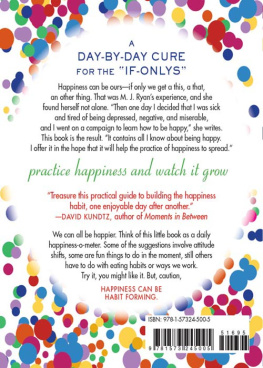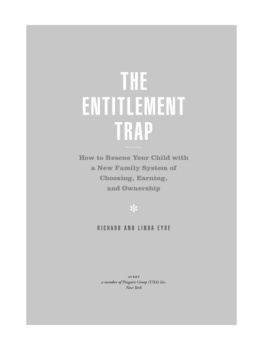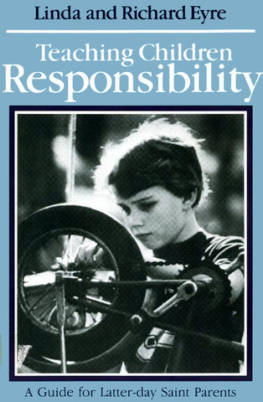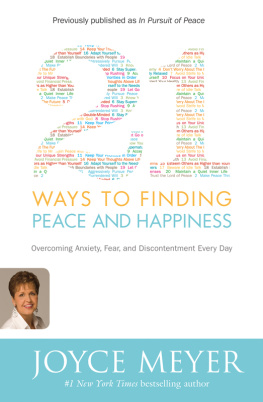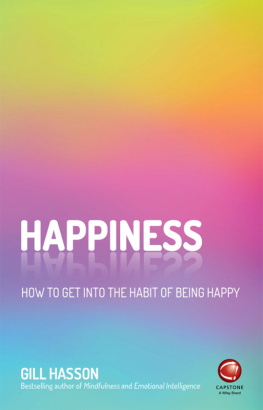

Copyright 2019 by Richard Eyre
All rights reserved.
Published by Familius LLC, www.familius.com
Familius books are available at special discounts for bulk purchases, whether for sales promotions or for family or corporate use. For more information, contact Premium Sales at 801-552-7298 or email orders@familius.com
Library of Congress Catalog-in-Publication Data
2018945275
pISBN 9781641700535
eISBN 9781641701044
Printed in the United States of America
Edited by Michele Robbins, Peg Sandkam, and Alison Strobel
Cover and book design by David Miles
10 9 8 7 6 5 4 3 2 1
First Edition

CONTENTS
FOREWORD
BY STEPHEN M. R. COVEY
I think what my good friend Richard Eyre has wonderfully done here in this creative and insightful book is to get to the very essence of happinessto the fact that how happy we are is inexorably connected to what we are seeking. Indeed, true joy cannot come to us, at least not consistently, if we are seeking the wrong things.
Thus, the key to more happiness lies not so much in what we have or even in what we do, but in how we thinkin the paradigms of our mind and in the desires of our hearts.
Part of maturing or growing up is learning to control ourselves and our emotions and behavior, learning to take responsibility for ourselves and for what we own, and learning to be independent in our thinking and self-reliant in our personal lives. And there is a degree of happiness in learning and practicing these things.
The question is whether there is a higher level of thinking and of living that brings with it a higher level of happiness.
Richard says that there is. He teaches us that once we have learned the lessons of control, ownership, and independence we can move beyond these useful but flawed frameworks and find a higher, truer way of thinking about ourselves and about our lives. I will let you discover these higher paradigms in the other side of this book.
I will just preview that these higher paradigms both derive from and produce trust in all its forms, including self-trust and relationship trust. And as my lifes work has been about trust, I have found that the connection of trust to happiness is overwhelming. As Ive worked with people and leaders all over the world, people will often use the word joy in describing the high-trust relationships in their lives. Plus, you can see itor the lack of itin their faces. At the core of strong and enduring relationships is trust, while the very definition of a bad relationship is little or no trust. I assert that trust both underlies and derives from these alternative attitudes Richard discusses.
I wish to conclude this brief foreword with a short personal story about this books tremendous author. When I was a college student, I came across a book that had two front coversthat had to be turned upside down and read from both sides. It was a book called, on one side, I Challenge You and, on the other side, I Promise You . Readers who were more drawn to challenges could read from that side and turn the book over to read the promise that went with each challenge, and readers who were more interested in promises could start there and flip the book upside down to see what they had to do to get the thing that was promised. The book was original and creative, and it impacted my life.
That book was coauthored by a young writer named Richard Eyre, who later shifted his emphasis to writing about family and parenting and life-balanceand become a New York Times #1 bestselling author in the process.
I am personally pleased that, all these decades later, Richard has written another double-cover book, and that this one is in some ways an advanced edition of the first onea challenge to reinvent our paradigms and our priorities, and a promise of a higher kind of happiness if we do.
STEPHEN M. R. COVEY
New York Times and # 1 Wall Street Journal
bestselling author of The Speed of Trust
For my childrenSaren, Shawni, Josh,
Saydi, Jonah, Talmadge, Noah, Eli, and
Charity-who I love more every day;
and each of whom has managed to pass
through the phases of control, ownership,
and independence faster than I did.
All royalties from this book go
to Eyrealm, a public charity that
helps children and families in
developing countries.
paradox
A contradiction or incongruity; a result
that is backward from what we expected.
Can we unwind some of the illusions and
inaccurate assumptions that are keeping us
from happiness?
PREFACE
PREMISE...
T he premise is this: We started with joy. We all began life with our default switches set to happiness. As babies, except when something (hunger, thirst, a little tummy ache, or a wet diaper) distracted us, our natural state was joy. We were easy to delight. We smiled often and laughedeven giggleda lot. People around us liked to make us happy, and our happiness made them happy. We were not self-conscious about our happiness. We waived our arms. We squealed.
But as we gradually grew older, that happiness began to ebb.
We started growing away from joy as we tacked on the years. By the time we were in kindergarten, while happiness was still our modus operandi, there were more and more things that pulled us away from it. As we went through elementary school we began to learn the concept of ownership, and with it came selfishness and competition. We began to learn the notion of control, and with it came pride and frustration. We began to learn the concept of independence, and with it came loneliness and isolation.
These concepts were taught to us by adults, who also served as the examples of them .
The premise is that ownership, control, and independence are essentially economic terms, and that when they are applied too broadly and adopted too comprehensively, they become our deceivers. They become the three thieves of our joy.
But remember that happiness is our natural state. We dont have to discover happiness; we merely need to recover it.
And we can recover it by grasping, exposing, and discarding three of the things that have sucked happiness away from us. We can come to understand the limitations and illusions and deceptions of control, ownership, and independence which combine, intertwine, and cocoon us into a place where we are confined and walled off from our natural state of joy.
The premise is that our pursuit of control, ownership, and independence is keeping us from the rest, the peace, the natural world, and the spontaneity that go into joy, even as that pursuit creates the pressure, the tension and stress, and the comparing and competing that bring unhappiness.
The premise is that we can recover our birthright of joy by exposing and incarcerating the three joy thieves, banning them from our brains, and adopting in their place three alternative attitudes, paradigms, viewpoints, or approaches to life that absorb rather than attack joy, that prompt rather than prevent happiness.
The premise is that happiness is less about our external circumstances and more about our internal paradigmsless about what happens to us and more about what happens in us.
Dont misunderstand, this is not a book about positive mental attitude or about simply deciding to be happy. Rather it is about changing how we see the world around uschanging the lens through which we see our lives and our circumstances and ourselves and literally turning upside down our notions of what we want and how we want to live.
Next page
